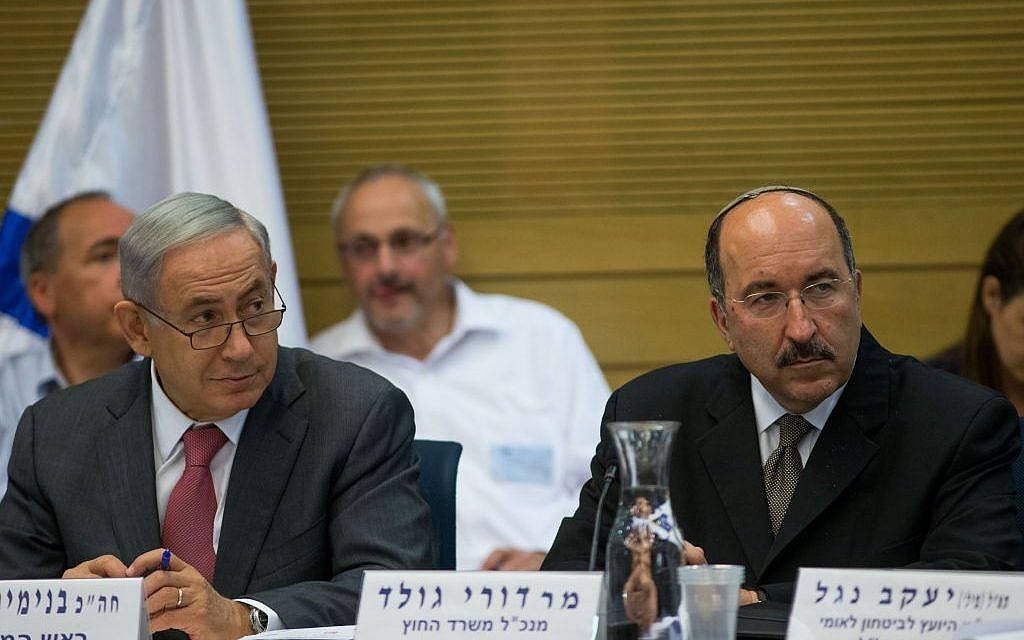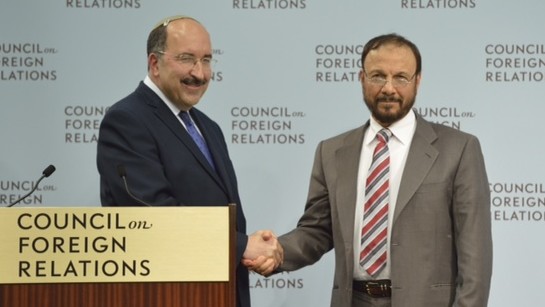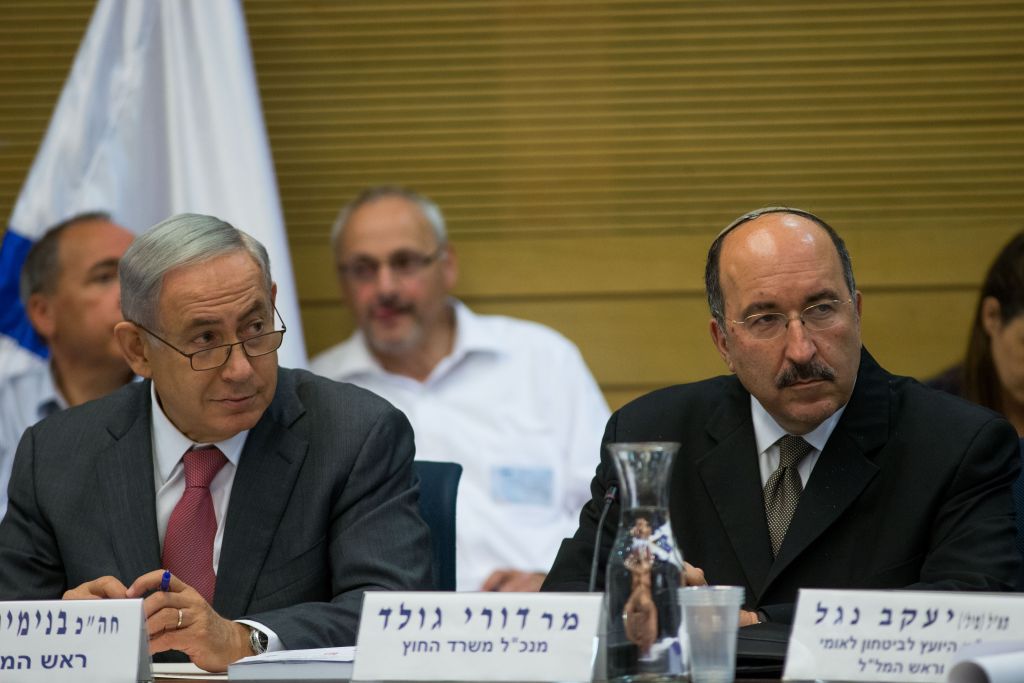While rumors fly over his return to service, the Jewish State’s American-born former ambassador to the UN says Israel has increasing international clout

NEW YORK — Former Israeli ambassador to the United Nations Dore Gold is pushing back against the idea that Israel is more isolated than ever.
Instead, he says, an increasing number of countries are not only willing, but are eager to embrace Israel.
Indeed, just hours before he sat down for the interview, Israel’s delegations at the United Nations co-sponsored a resolution with Saudi Arabia at the UN Human Rights Committee condemning the Syrian government for human rights abuses.
Several days after that, Israel announced it would open an embassy in Rwanda and there were reports that Israeli chess players may participate in an upcoming chess tournament in Riyadh.
Additionally, for the first time the United Kingdom voted against a UN resolution demanding Israel return the Golan Heights to Syria. The resolution was one of six anti-Israel resolutions passed by the General Assembly on the International Day of Solidarity with the Palestinian People.
Britain’s vote was significant given that November 29 was also the 70th anniversary of the historic UN resolution that divided the British Mandate of Palestine into two states, Jewish and Arab.
Currently president of the Jerusalem Center for Public Affairs, from May 2015 until October 2016, Gold served as director-general of the Foreign Affairs and resigned from the position “out of consideration for his family.”
At the time, Gold told The Times of Israel, “Life has ebbs and flows, periods in which you give more attention to one thing and less attention to another thing. But in the not too distant future I will be on the front lines again, defending Israel and creating new international contacts.”
“I will be back on the front lines of diplomatic activity in the very near future,” he said. “And if the prime minister needs me, I am available 24/7.”
Currently there are whispers in diplomatic circles that Prime Minister Benjamin Netanyahu might call upon Gold to return to government service, perhaps as part of peace negotiations with the Palestinian Authority. When asked by The Times of Israel to confirm, however, Gold merely smiled. (The Times of Israel later contacted Gold for clarification, but did not receive a response.)
If proven true, it would of course not be a new venture for the longtime diplomat. Gold, who grew up in a Conservative Jewish home, could be a good re-addition to Netanyahu’s staff during this time of dissonance with the Diaspora, in addition to the ever-present Israeli-Palestinian conflict. Among other roles during his long career in service, he served as an adviser to the Israeli delegation at the Madrid Peace Conference in 1991 and he was involved in the Oslo Accords.
The following conversation has been edited for brevity and clarity.
To start, what do you think the chances are for real progress in the political process between Israel and the Palestinians under the Trump administration? How different, if at all, is the situation compared with past administrations?
We’ve had a lot of lessons we’ve learned from past diplomatic initiatives. The people of Israel really do want peace; they want peace with security. Unfortunately we learned the hard way if our security interests are not protected, if our vital interests are ignored, we invite the next round of conflict.
Those of you who were in Jerusalem or Tel Aviv during the Second Intifada know what an exploding bus looks like. And those buses exploded when we had already signed accords. We can never allow that to happen again. Period. So any arrangement we might make with our Palestinian neighbors will not just be with them, it will have to be with Arab states as well.
Second of all, the security element in any understanding with our Palestinian neighbors is going to have to be far stronger than anything else seen in diplomacy. One thing I can tell you, I believe the Trump Administration understands that.
Let’s talk about internal Palestinian rapprochement between Hamas and Fatah. Do you see a real Palestinian unity on the horizon and if so what would such unity look like?
These organizations, Fatah and Hamas, have been — I can’t describe them as anything else but enemies in the past. In 2007 when Hamas waged a coup d’état against the Palestinian Authority government in the Gaza Strip they were throwing Fatah members off the roof. It was unveiled and disclosed, extreme hostility. I don’t know if rapprochement is going to work. Much also depends on regional conditions.
When Hamas waged a coup d’état against the Palestinian Authority government in the Gaza Strip they were throwing Fatah members off the roof
Hamas, particularly its military wing, is heavily reliant upon Iran. Fatah is starting to improve its ties with Saudi Arabia. Now how that all works out I can’t tell you, but you understand we are talking about inter-Palestinian understandings in a region that is volatile but changing.
You famously had dealings with the Arab world, states with which Israel has no diplomatic relations: do you see a real chance for progress there, separately from the Palestinian track? How does the Islamic Republic of Iran fit into it — particularly now as we’ve seen an escalation between Saudi Arabia and Iran regarding Yemen and Lebanon, and just in the past few days between Israel and Russia regarding Syria?
I’m going to share with you a personal experience: I have different hats I wear. I’ve been a formal Israeli diplomat; most recently I was director-general of the Ministry of Foreign Affairs. Unofficially I ran a think tank, a research institute. One of my experiences running this think tank was in the years 2014 and 2015 when I was not in government. I got to know a major general from Saudi Arabia. His name is Anwar Eshki and he runs a think tank in Jeddah. [Eshki is a close adviser to King Salman.] I was determined, no matter what the cost would be, to create a dialogue. Now this was not an official channel, but things don’t happen without somebody winking and saying maybe this should happen.

What I discovered is that Saudi Arabia’s perception of our common challenges in the Middle East was almost identical to what the Israeli perception was. We had experienced for years the threat of Hezbollah. They were experiencing something relatively new for them: the deployment of Iranian rockets and missiles in Yemen, which were fired on Saudi Arabia. They had an enormous interest in understanding how we dealt with Hezbollah because that would guide them on how they should deal with the Houthis in Yemen. The Houthis were receiving an enormous amount of weaponry from and acting as an Iranian surrogate.
At one point, I can share with you, the Saudi general approached me, and said that this Iran agreement, this nuclear agreement — which the previous administration was pushing along with the other members of the P5+1 — was something that made Saudi Arabia nervous. He even approached me and said, ‘You know what? I’m prepared to come out of hiding. I am prepared, Dore, to go with you to the US Congress and give testimony to a committee about the dangers of the Iran agreement.’ I mean this was one of those moments like ‘Man Walks on Moon; Saudi and Israeli Together in Public.’ I suggested to him however, this would be a direct affront to the administration, a poke in the eye.
This was one of those moments like ‘Man Walks on Moon; Saudi and Israeli Together in Public.’
What I recommended was since we’re both think tanks; let’s go to a think tank. We went to the Council on Foreign Relations. The whole US media came to our event. For the first time an Israeli and a Saudi appeared together speaking about their common concern with the growth of Iran’s nuclear program. One was speaking Arabic. One was speaking English, but basically we were speaking the same language.
You have been active in this arena for many years — in your view have you seen a real shift in the way the world now sees Israel?
That’s the most important question you’ve asked. I was director-general of the Ministry of Foreign Affairs, which means I have all the cable traffic from all Israeli embassies from across the world and I can get a sense of what is happening. Now it is very important to understand as background that it is customary in Israel to say, ‘We’ve never been so isolated in the world as now.’ This is a mantra one hears all the time.

I remember I was on my way to the Herzliya Conference about two years ago. I put on the radio and the organizer of the Herzliya Conference was saying: ‘We’ve never been as isolated as now.’ So I changed my entire speech and basically said the following points, which I’ll say now: There’s a revolution going on today in Israel’s foreign policy, and it is worldwide.
For the first time countries like China, Korea, Japan, Vietnam, India have either negotiated free trade agreements with Israel and completed them, or they’ve begun the negotiations. That never happened before. And we’re not talking about having a cultural club in Cambodia. We’re talking about the stuff these countries are primarily concerned with.
Shift over to Africa. I accompanied Prime Minister Netanyahu in July 2016 to Uganda [for the 40th commemoration of the Entebbe raid]. Four heads of state of the countries he was visiting on that tour, Ethiopia, Kenya, Rwanda and of course Uganda, came for that event. But so did representatives of three other African states. We had seven African states coming to greet Israel in Africa. And we are continuing this initiative into West Africa and the countries of the Sahara. We have a revolution going on there.
Two other observations: Latin America, which had become extremely hostile to Israel, particularly Brazil and Argentina, is now friendly and embracing Israel. Many other countries in Latin America are [also] sending us signals.

Finally, the Arab world. Today Israel can talk to, have a diplomatic conversation with, almost every Arab state. We’ve had breakthroughs. I opened an Israeli office in Abu Dhabi. Of course it was to an international organization based in Abu Dhabi. But it didn’t matter — we were running around Abu Dhabi to get an apartment for an Israeli ambassador.
These are changes that were unthinkable years back, but they are occurring in a period when a number of people who are just, I don’t know — sourpusses — like to say that Israel is more isolated than ever.





@ david melech:
That he can communicate with Americans. The same point was made about Netanyahu when he was Israel’s ambassador to the UN in the 80s.
Incidentally, it’s an advantage that Mudar Zahran also has.
People who grew up here can winningly make their case on tv to the American public in a relaxed and colloquial way. Just folks.
One has to be able to do that to win the presidency, as well.
Like Clinton at McDonalds, Bush being described as a nice guy you’d like to have beer with. Obama with his jes folks drawl.
“Beau James” 1957 film with Bob Hope, a biopic of the 1920’s mayor of New York, Jim Walker, parodies that quality of American politics.
I believe it began with Andrew Jackson in the 1820s.
‘The 63-year-old Connecticut native’what does this have to do with the article?????????